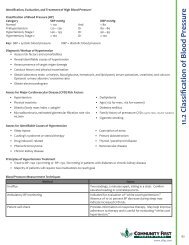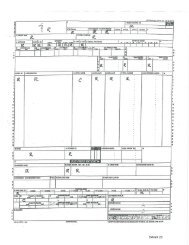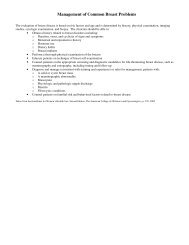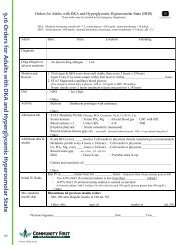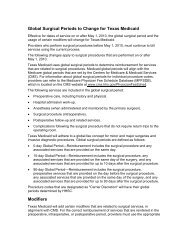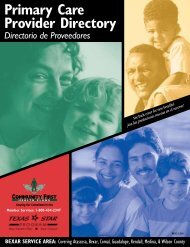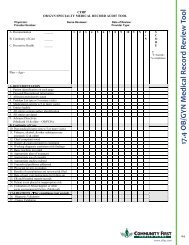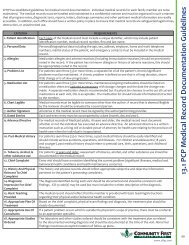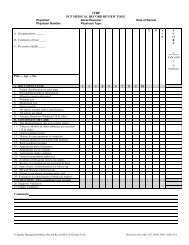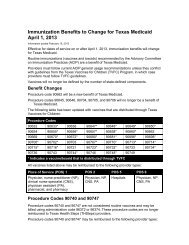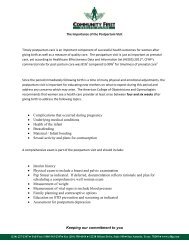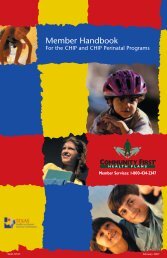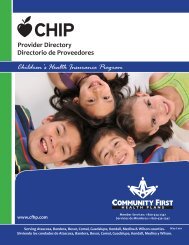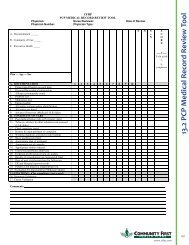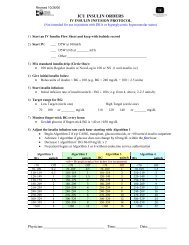Full Clinical Guidelines - Community First Health Plans.
Full Clinical Guidelines - Community First Health Plans.
Full Clinical Guidelines - Community First Health Plans.
Create successful ePaper yourself
Turn your PDF publications into a flip-book with our unique Google optimized e-Paper software.
Causes of Resistant Hypertension<br />
• Improper BP measurement<br />
• Excess sodium intake<br />
• Inadequate diuretic therapy<br />
• Medication<br />
• Inadequate doses<br />
• Drug actions and interactions (e.g. nonsteroidal anti-inflammatory drugs (NSAIDs), illicit drugs, sympathomimetrics,<br />
oral contraceptives)<br />
• Over-the-counter (OTC) drugs and herbal supplements<br />
• Excess alcohol intake<br />
• Identifiable causes of hypertension<br />
Compelling Indications for Individual Drug Classes<br />
Compelling Indication<br />
• Heart failure<br />
• Post myocardial infarction<br />
• High CVD risk<br />
• Diabetes<br />
• Chronic kidney disease<br />
• Recurrent stroke prevention<br />
Initial Therapy Options<br />
THIAZ, BB, ACEI, ARB, ALDO ANT<br />
BB, ACEI, ALDO ANT<br />
THIAZ, BB, ACEI, CCB<br />
THIAZ, BB, ACEI, ARB, CCB<br />
ACEI, ARB<br />
THIAZ, ACEI<br />
Key: THIAZ = thiazide diuretic, ACEI = angiotensin converting enzyme inhibitor, ARB = angiotensin receptor blocker<br />
BB = beta blocker, CCB = calcium channel blocker, ALDO ANT = aldosterone antagonist<br />
Strategies for Improving Adherence to Therapy<br />
• Clinician empathy increases patient trust, motivation, and adherence to therapy<br />
• Physicians should consider their patients’ cultural believes and individual attitudes in formulating therapy<br />
Principles of Lifestyle Modification<br />
• Encourage healthy lifestyles for all individuals<br />
• Prescribe lifestyle modifications for all patients with prehypertension and hypertension<br />
• Components of lifestyle modifications include weight reduction, DASH eating plan, dietary sodium reduction, aerobic<br />
physical activity, and moderation of alcohol consumption<br />
Lifestyle Modification Recommendations<br />
Weight reduction<br />
DASH eating plan<br />
Dietary sodium reduction<br />
Aerobic physical activity<br />
Modification Recommendation Avg SBP Reduction †<br />
Maintain normal body weight (body<br />
mass index 18.5 – 24.9 kg/m 2 )<br />
Adopt a diet rich in fruits, vegetables,<br />
and low fat dairy products with reduced<br />
content of saturated and total fat<br />
Reduce dietary sodium intake to ≤<br />
100 mmol per day (2.4 g sodium or 6 g<br />
sodium chloride)<br />
Regular aerobic physical activity (e.g.,<br />
brisk walking) at least 30 minutes per<br />
day, most days of week<br />
Moderation of alcohol consumption Men: limit to ≤ 2 drinks* per day<br />
Women and lighter weight persons:<br />
limit to ≤ 1 drink* per day<br />
* 1 drink = ½ oz or 15 mL ethanol (e.g., 12 oz beer, 5 oz wine, 1.5 oz 80-proof whiskey<br />
† Effects are dose and time dependant<br />
5 – 20 mmHg/10 kg<br />
8 – 14 mmHg<br />
2 – 8 mmHg<br />
4 – 9 mmHg<br />
2 -4 mmHg<br />
1<br />
Taken from National Institutes of <strong>Health</strong> (NHI) <strong>Guidelines</strong> on High Blood Pressure. National Institutes of <strong>Health</strong> and National Heart, Lung, and Blood Institute<br />
developed the Seventh Report of the Joint National Committee on Prevention, Detection, Evaluation, and Treatment of High Blood Pressure (JNC7) , NIH<br />
Publication No. 03 - 5231, May 2003<br />
94 H EALTH PLANS<br />
www.cfhp.com



